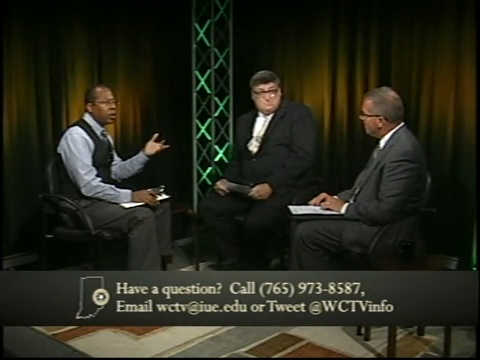Purdue Polytechnic Statewide faculty and administrators appeared Thursday (July 23) on "IN Focus," a public affairs broadcast on WGTV / Whitewater Community Television in Richmond. Michael Swain, director of Purdue Polytechnic Richmond, James G. Maley, clinical assistant professor of technology leadership and innovation, and Andy Schaffer, associate dean for Purdue Polytechnic Statewide, discussed the history of Purdue's presence in Richmond, the partnerships Statewide locations make with industry, and the college’s recent name change.
History and academic programs
A unique blend of degree programs is offered at each campus. "Purdue researched which degree programs are pertinent to the area. We have specialized programs," Swain said. At Purdue Polytechnic Richmond, which is co-located with Indiana University East, about 30 students graduate each year. "The people we graduate go out and make an immediate impact because of the disciplines we teach here, including a lot of application-based learning. We have programs [through which] people now go into jobs to do planning, designing, and thinking through the processes to make them better and improve products they're making."
Maley discussed his department's specific focus on people and process. "I like to look at the three P's: product, people, and process. Product is often the engineering technology and design of things. You also have to figure out how to work with people to improve their performance and how to work with processes so that things can be made more efficiently." The department provides "practical, applied leadership abilities," he said.
Maley's experience working in industry, including at Ford Motor's Connorsville, Indiana, facility, influences his role as an educator. In industry, he said, "on a day-to-day basis, you know if you've achieved something. As faculty, you're investing in the lives of individuals." Students who work during the day and attend classes in the evening help provide rewarding feedback to faculty. "We have people coming back who say, 'I actually applied what I did in class this week, and it made a difference.' That's very exciting."
Local impact
Statewide locations maintain close relationships with area businesses, reacting to their needs by tapping into program strengths. Swain described how students in Richmond's computer graphics technology program worked with industry partners. "We offered a class for people who run their own businesses on how to develop a marketing package for themselves," Swain said. "Our seniors worked with a local architect, offering services a design firm would offer, as a class project. It gives our students experience and helps out the community as well."
Transforming for the future
Schaffer described the thought process behind the college's recent name change. "A 50-year anniversary is a reflection point, a time for new ideas, to adapt for an environment which is constantly changing. 'Poly' means multiple, and 'technique' from its origins in Europe means 'arts' or 'skills.' The idea of the polytechnic is that our students graduate with many skills. The name change is to better reflect what we're doing now and in the future."
Using engineering technology as an example, Schaffer said, "If you think about the real world, there are very few purely electrical systems or purely mechanical systems. In the old mode of education, those were silos." When students graduate, they need to work together with people from multiple disciplines, he said, so Purdue Polytechnic will focus on blending disciplines through real-life, industry-focused projects and also integrating the liberal arts.
"It's not just a name change," Schaffer added. "We really are rethinking how we're doing things. Going forward, no student will leave Purdue Polytechnic without working on a variety of real-life industry projects or challenges for society." Traditionally the realm of senior projects, Schaffer noted that even first-year students will now be doing such projects "right out of the gate, to create that innovative, creative mindset that industry clamors for." He added that the college wants industry leaders to praise our graduates not only for their technical proficiency but also for being capable communicators, team players, and innovators. "There's strong evidence that shows when you teach 'just in time' and in context, students better retain that knowledge. That's what we want to do with the polytechnic approach" at all Statewide locations and in West Lafayette, Schaffer said.
Eric Marsh, executive director of Whitewater Community Television, hosted the program. Watch the broadcast in its entirety here.

